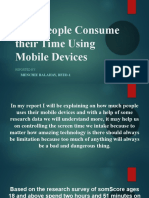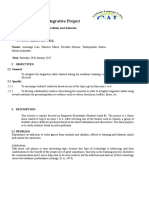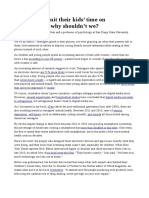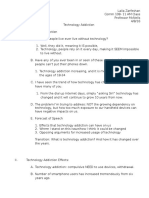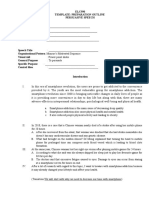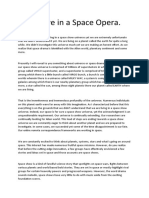Gabriela Cifuentes y Nicolás Velásquez
Video: Learning to look up again – controlling your smartphone addiction | Ross Sleight |
TEDxLeamingtonSpa- TEDx Talks
Listening Project
Pre-listening activity
The students will be shown some images and, with them, they will have to describe what
they see, explain how that makes them feel and reveal what their opinions are. This is meant
to be done in small groups.
Having done this, with the whole class, a little discussion will be held.
The guiding questions are:
1. Do you consider being glued to your phone is usually a bad thing? If so, are you
willing to change it? Why?
2. Do you think that human beings are becoming more dependent on their
smartphones? If so, what are the consequences of this phenomenon?
While-listening Activity
The following TEDx talk is about smartphone addiction. Complete the following exercises
based on the information provided in the video. You will listen to each part 2 times and a full
time at the end.
1. Listen to the first part of the video and fill in the blanks. Use no more than 3 words.
(2:34-3:23)
20 years of the orator's life have been spent working in digital media. In the last 10 years, he
has been creating products and services while working with smartphones. He explains that
all of his life, he has tried to use technology to make people's lives better, to make them
simpler and easier. However, he explains that he's worried because of how smartphones are
being used. Not only by strangers on the train or the street, but also his colleagues, friends,
family and teenagers. According to him, we seem to be spending a growing amount of our
time staring down at our phones, glued and obsessed with this virtual home.
2. Based on the second part of the video, answer the following questions with T/F/NG.
Justify your answers. (3:24 - 4:32)
a) People who are 16 to 35 are less likely to spend too much time on their smartphones
compared to other age groups (F)
On average in the UK, 39% of people say that they spend way too much time with
their smartphone, and that rises to 55% of people who are 16 to 35.
b) The younger population is more aware of the excessive amount of time they spend
on their smartphones (T)
� The younger you are, the more likely you are to think that you are spending too much
time with your smartphone
c) Most people who think they use their smartphones excessively are not making any
efforts to change their habits (F)
If you are one of those people, you're actually trying to change that because 74% of
people who think they spend too much time on their smartphone are trying to reduce
that time
d) On average, people in the UK spend more time on their smartphones than on any
other daily activity (NG)
3. Complete the following chart based on the information provided in the third part of
the video. (4:34 - 5:24)
33.33% use our smartphones with our friends and our family whilst eating
50% wander along the streets looking down at our smartphone
11% say that we actually crossed the road with our smartphone, looking
Statistics
down at it
33.33% will wake up and within five minutes, reach for our smartphone
10% responded to our smartphone whilst having sex
● Best-case scenario: it’s alienating
● Worst-case scenario: it’s antisocial behavior
Reflection
● The real problem is: our behavior with the smartphone
Post-listening activity
A group activity will be carried out.
The steps for it are the following ones:
1. The students will be making groups of 2 or 3 participants. Each group will have a
name, given by the participants.
2. Each group has to brainstorm and present one creative and useful daily plan to
become more independent from our technological devices (smartphones, computers,
etc.).
3. The most innovative plan will receive a reward.







